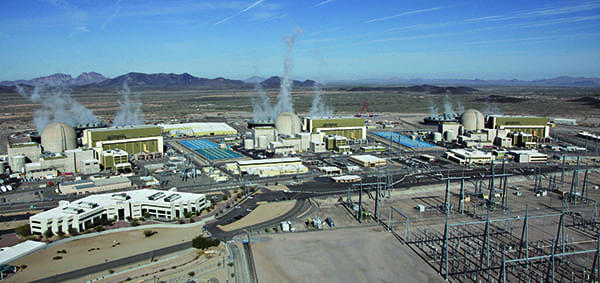Digital Tools Help Increase Output, Reduce Costs at Palo Verde
Palo Verde is the largest nuclear-generating site in the U.S. It has three of the five largest nuclear units in the country, with each pressurized water reactor licensed at almost 4,000 MWth. Like many plants today, it faces flat demand, rising renewable penetration, and market pressure due to low power prices.
In the nuclear industry, where typical capacity factors are already at record highs, plants have been forced to look for ways to produce energy at a lower cost without sacrificing safety. One of the biggest opportunities for the industry is lowering its operations and maintenance costs. Those costs have risen 23% over the past 20 years, according to an analysis from Uptake, a Chicago, Illinois-based industrial artificial intelligence company that looked at Federal Energy Regulatory Commission data.
Palo Verde (Figure 1) needed a solution that could validate changes to preventive maintenance strategies for its non-critical equipment because then-in-use procedures were perceived as being overly cautious. Understanding the possible risks and cost impacts of changing maintenance strategies while avoiding plant procedure violations was a pressing concern.
Finding a Solution
Previously, Palo Verde’s approach to setting and managing its preventive maintenance schedules was based on standard recommendations provided by original equipment manufacturers (OEMs) for the nuclear industry. This strategy was limiting and problematic because it relied on blanketed maintenance guidance, and that guidance did not take into account the actual condition of the plant’s equipment. Industrial machinery degrades at varying rates that pre-written guidance cannot fully predict. This approach was also not cost-effective.
Palo Verde selected Uptake’s Asset Performance Management (APM) application (formerly APT’s Preventance product) for its ability to inform and implement reliability-centered maintenance strategies. The goal was to deliver the required amount of equipment reliability at the minimum cost. APM leverages the Asset Strategy Library—the world’s largest database of industrial equipment types, failure modes, and maintenance tasks—along with user economic inputs to determine the most cost-effective maintenance strategy for any component. Uptake’s APM application provided Palo Verde with data-backed recommendations on how to optimize its maintenance programs.
Evaluating the Results
Using this new application Palo Verde has increased the effectiveness of repairs, decreased maintenance costs, and improved the uptime and reliability of its assets based on their specific conditions. The new strategy has led to better operational safety, improved power production, and significant cost savings by eliminating or extending the frequency of preventive maintenance tasks.
The APM application enabled Palo Verde to evaluate:
■ Specific equipment failure modes on small motors, breakers, air-operated valves, and other items.
■ Maintenance tasks that can be applied to address those failure modes.
■ Risk in performing or not performing specified maintenance.
■ Maintenance effectiveness in terms of cost and expected equipment reliability, measured by expected economic value.
Palo Verde used the inherent criticality checklist to discover that a valve that had previously been labeled as non-critical was in fact highly critical. It was a single valve, but when it failed, the whole plant tripped, costing $2 million a day in lost revenue.
The software recommended that Palo Verde staff simply needed to add a key maintenance task to prevent an occurrence at their plant. The task was added and the change implemented into the management system. It’s now a regular part of the plant’s preventive maintenance strategy.
The new software empowered Palo Verde to digitally transform its operations. Across its three nuclear units, Palo Verde was able to:
■ Use worker hours more efficiently and effectively by identifying and prioritizing high-reliability-impact maintenance decisions.
■ Increase equipment availability and reliability, decrease the risk of failure, and ensure safety.
■ Execute cost-effective maintenance decisions to support continuous, reliable power production.
Uptake’s APM delivered insights and recommendations that enabled Palo Verde to achieve measurable business results. Specifically, APM helped Palo Verde:
■ Reduce the number of annual working hours spent on preventive and corrective maintenance by 37%.
■ Realize $10 million in annual cost savings, representing a 20% cost reduction.
■ Improve its overall capacity factor and set a record for power production.
In addition to improving production and reducing costs, eliminating unneeded maintenance has increased the station’s critical equipment availability, thus improving overall safety. Furthermore, spending less time on equipment maintenance reduces workers’ radiation exposure and dose received. Palo Verde has publicly reported a 57% annual reduction when comparing exposure before and after the solution was implemented.
These results have major implications for the nuclear industry, which is facing increasing pressure to lower costs. By digitally transforming preventive maintenance strategies, nuclear plants can produce even more energy while delivering on the nuclear promise of safe and reliable operation. ■
—Mark Benak is vice president of business ventures at Uptake, an industrial artificial intelligence company.
The post Digital Tools Help Increase Output, Reduce Costs at Palo Verde appeared first on POWER Magazine.
